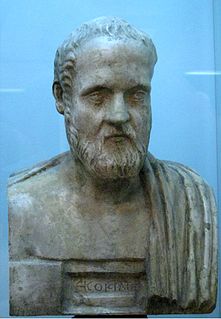A Quote by Isocrates
We should not call a city happy because it attracts masses of citizens from everywhere; a fortunate city is one in which the race of the original inhabitants is best preserved.
Related Quotes
Do you know what Agelisas said, when he was asked why the great city of Lacedomonie was not girded with walls? Because, pointing out the inhabitants and citizens of the city, so expert in military discipline and so strong and well armed: "Here," he said, "are the walls of the city," meaning that there is no wall but of bones, and that towns and cities can have no more secure nor stronger wall than the virtue of their citizens and inhabitants.
So the city became the material expression of a particular loss of innocence – not sexual or political innocence but somehow a shared dream of what a city might at its best prove to be – its inhabitants became, and have remained, an embittered and amnesiac race, wounded but unable to connect through memory to the moment of injury, unable to summon the face of their violator.
That the sight of people attracts still other people, is something that city planners and city architectural designers seem to find incomprehensible. They operate on the premise that city people seek the sight of emptiness, obvious order and quiet. Nothing could be less true. The presences of great numbers of people gathered together in cities should not only be frankly accepted as a physical fact... they should also be enjoyed as an asset and their presence celebrated.
The citizens of a city are not guilty of the crimes committed in their city; but they are guilty as participants in the destiny of [humanity] as a whole and in the destiny of their city in particular; for their acts in which freedom was united with destiny have contributed to the destiny in which they participate. They are guilty, not of committing the crimes of which their group is accused, but of contributing to the destiny in which these crimes happened.
I stared out the window the whole way, because it was raining, which is how I like the city best. It looks like it's been polished up. All the streets shine and lights from everywhere reflect off the black. It's like the whole place has been dipped in sugar syrup. Like the city is some kind of big candy apple.

































